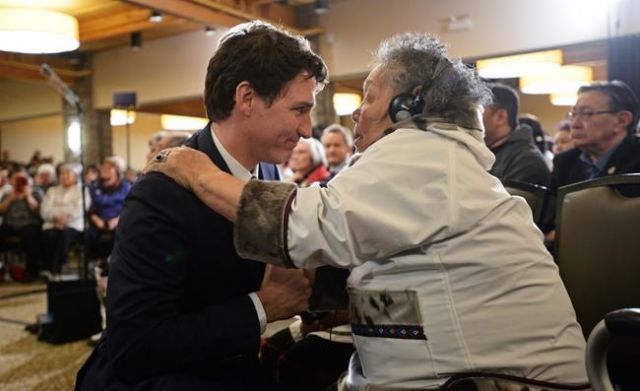
Prime Minister Justin Trudeau apologized on Friday for the way Inuit in northern Canada were treated for tuberculosis in the mid-20th century, calling it colonial and misguided.
Trudeau was in Iqaluit to deliver an apology to the Inuit on behalf of the federal government.
“Today, I am here to offer an official apology for the federal government’s management of tuberculosis in the Arctic from the 1940s to the 1960s,” he said. “Many of you know all too well how this policy played itself out.”
Trudeau is acknowledging that many people with TB died after being removed from their families and communities and were taken on gruelling journeys south on ships, trains and aircraft.
The prime minister made the visit to the capital of Nunavut a day later than planned after bad weather prevented his plane from landing on Thursday.
Trudeau also announced the opening of a database that Inuit families can soon use to find loved ones who died when they were transported south for treatment.
The database is part of a wider initiative called Nanilavut, which means “let’s find them” in Inuktitut.
The apology had been in the works for the better part of two years, since Trudeau signed an Inuit-Crown partnership agreement in 2017.
Nunavut Tunngavik Inc., a representative for Inuit in Nunavut, has said it wanted to help family members locate burial sites of those who died during tuberculosis treatment from the 1940s through the 1960s. Their bodies were buried in southern Canada instead of being returned to their relatives.
The mistreatment of Inuit during the TB outbreaks was a “massive human rights failure” from the government of Canada in the treatment of its own citizens, said Natan Obed, president of Inuit Tapiriit Kanatami (ITK).
His organization acts as the national voice of the roughly 60,000 Inuit living in four sections of northern Canada.
The government took far too long to formally acknowledge wrongdoing, Obed said.
“It is a long time, and I do wish the apology came sooner.”
Inuit who were infected with TB in the mid-20th century were taken into government care, separated from their families and transported aboard ships to sanatoriums in the south of Canada, where they were disconnected from their culture and language.
In many cases, those who died from the disease were buried without their families knowing what happened to them or where they were laid to rest.


